- Home
- Chinua Achebe
Hopes and Impediments: Selected Essays 1965-87 Page 9
Hopes and Impediments: Selected Essays 1965-87 Read online
Page 9
Let us emulate those men of Benin, ready to guide the curious visitor to the gallery of their art, willing to listen with politeness even to his hasty opinions but careful, most careful, to concede nothing to him that might appear to undermine their own position within their heritage or compromise the integrity of their indigenous perception. For supposing the artists of Benin and of Congo and Angola had agreed with Nyendael in 1701 and abandoned their vision and begun to make their images in the style of “developed” Portugal, would they not have committed a grave disservice to Africa and ultimately to Europe herself and the rest of the world? Because they did not, it so happened that after the passage of two centuries other Europeans, more sensitive by far than Nyendael, looked at their work again and learnt from it a new way to see the world.
This essay is based on a paper read to the Association for Commonwealth Literature and Language Studies at Makerere University, Uganda, in January 1974; later published in Morning Yet on Creation Day, Doubleday Anchor Books, 1975.
MANY YEARS AGO at a writers’ conference in Makerere, Uganda, I attempted (not very successfully) to get my colleagues to defer a definition of African literature which was causing us a lot of trouble. I suggested that the task might become easier when more of our produce had entered the market. That was ten years ago. I was saying in effect that African literature would define itself in action; so why not leave it alone? I still think it was excellent advice even if it carried a hint of evasiveness or even superstition.
I do admit to certain residual superstitions; and one of the strongest is the fear of names, of hurrying to a conclusion when the issue is still wide open. If I may paraphrase a proverb which seems to me appropriate: Do not underrate a day while an hour of light remains. In other words, be careful, for one hour is enough to do a man in.
Edogo’s mind was in pain over the child. Some people were already saying that perhaps he was none other than the first one. But Edogo and Amoge never talked about it; the woman especially was afraid. Since utterance had power to change fear into living truth they dared not speak before they had to.1
The world of the creative artist is like that. It is not the world of the taxonomist whose first impulse on seeing a new plant or animal is to define, classify and file away. Nor is it the world of the taxidermist who plies an even less desirable trade.
But I am never fully consistent, not even in my superstitions. I always find thoughts antagonistic to my secure position floating dangerously around it. It is these floating thoughts I wish to talk to you about.
The first is that the African novel has to be about Africa. A pretty severe restriction, I am told. But Africa is not only a geographical expression; it is also a metaphysical landscape—it is in fact a view of the world and of the whole cosmos perceived from a particular position. This is as close to the brink of chaos as I dare proceed. As for who an African novelist is, it is partly a matter of passports, of individual volition and particularly of seeing from that perspective I have just touched with the timidity of a snail’s horn. Being an African, like being a Jew, carries certain penalties—as well as benefits, of course. But perhaps more penalties than benefits. Ben-Gurion once said: “If somebody wants to be a Jew, that’s enough for me.” We could say the same for being an African. So it is futile to argue whether Conrad’s Heart of Darkness is African literature. As far as I know, Joseph Conrad never even considered the possibility. In spite of all temptations he remained an Englishman! And it is not even a matter of colour. For we have Nadine Gordimer (who is here today), Doris Lessing and others.
And then language. As you know, there has been an impassioned controversy about an African literature in non-African languages. But what is a non-African language? English and French certainly. But what about Arabic? What about Swahili even? Is it then a question of how long the language has been present on African soil? If so, how many years should constitute effective occupation? For me it is again a pragmatic matter. A language spoken by Africans on African soil, a language in which Africans write, justifies itself.
I fully realize that I am beginning to sound like a bad dictionary—the type you take a strange word to and it defines it with a stranger word; you look that up and it gives you back your original strange word; so you end up with two mysteries instead of one! But that is the reality of our situation, and it is surely more useful to begin to deal with its complexity than to propose catchy but impossible simplifications.
At the root of all these strange and untidy thoughts lies a monumental historical fact, Europe—a presence which has obsessed us from Equiano to Ekwensi. For Equiano a preoccupation with Europe was pretty inevitable. After all, he had only just recently freed himself from actual enslavement to Europeans. He lived in Europe and was married to a European. His ancestral Igboland had become a fragmented memory.
In our own time a preoccupation with Europe has seemed almost equally inevitable despite the passage of nearly two hundred years. In the colonial period and its aftermath we were preoccupied with Europe in the form of protest. Then a bunch of bright ones came along and said: “We are through with intoning the colonial litany. We hereby repudiate the crippling legacy of a Europe-oriented protest. We are tough-minded. We absolve Europe of all guilt. Don’t you worry, Europe, we were bound to violence long before you came to our shores.” Naturally, Europe, which was beginning to believe the worst about itself, is greatly relieved and impressed by the mental emancipation, objectivity and sophistication of these newcomers. As if any intelligent writer of protest had ever taken a starry-eyed view of Africa or doubted the reality of evil in Africa, the new anti-protest, broad-minded writer will now endorse the racist theory that Africa is evil, is the heart of darkness.
It is this illusion of objectivity, this grotesque considerateness, this perverse charitableness which asks a man to cut his own throat for the comfort and good opinion of another, that I must now address myself to.
Quite often the malady (for it is indeed a sickness) shows fairly mild symptoms and is widespread; at other times it comes in its virulent forms. But mild or severe, it manifests itself as self-disgust and an obscene eagerness to please our adversary.
There is a Nigerian academic who went to study in Britain in the late 1920s and decided to become an Englishman. So he settled down in Britain after his studies, married and raised a family, and by all accounts was a perfectly happy man. Forty years later as a result of an unhappy conjunction of events he found himself appointed to an administrative position in a Nigerian university. To his first press interviewer he boasted that he spoke no Nigerian language. He cannot recognize Nigerian food, let alone eat it. Given a chance he will appoint a European over a Nigerian to teach at his university; his argument: a university, as the name implies, is a universal institution.
But fortunately, this man is not a writer. For wouldn’t it be awful if writers—those bright hopes of our society—should become afflicted with such a warped vision; a vision which creates a false polarity between an object and its abstraction and places its focus on the abstraction? Personally, I am no longer entirely optimistic. Let me present two short passages of the kind that has been causing me great discomfort:
This is the confrontation which The Interpreters presents. It is not an “African” problem. Events all over the world have shown in the new generation a similar dissatisfaction … Thus Soyinka, using a Nigerian setting, has portrayed a universal problem. This is what makes both this novel and the whole corpus of Soyinka’s work universally valid.2
Before I go on, let me make two points. First, I am not concerned with Professor Eldred Jones’s evaluation of Soyinka, but with the terms he has chosen for that evaluation. The second point is that I regard Eldred Jones as our finest literary scholar, a man of great sensitivity and perception whom I should have much preferred not to disagree with. But the dogma of universality which he presents here (I believe, absent-mindedly) is so patently false and dangerous and yet so attractive that it ought not to go unchall
enged. For supposing “events all over the world” have not shown “in the new generation a similar dissatisfaction …,” would it truly be invalid for a Nigerian writer seeing a dissatisfaction in his society to write about it? Am I being told, for Christ’s sake, that before I write about any problem I must first verify whether they have it too in New York and London and Paris?
What Professor Eldred Jones is proposing is that I renounce my vision, which (since I do not work with the radio telescope at Jodrell Bank) is necessarily local and particular. Not so long ago a similar proposition was made to me, an attempt to discredit my vision and the absolute validity of my experience. But it came from “expected quarters.” At the end of the war in Nigeria (in which, you may know, I was on the wrong side), I had an invitation to visit New Guinea and Australia. But some official or officials in Lagos saw to it that I did not get a passport. When I protested to the Commissioner for External Affairs he wrote me a nice, intriguing letter with words to this effect:
Dear Achebe,
Thank you for your letter in which you complained about difficulties which you thought you had with my officials …
You can see, can’t you, the close kinship between that letter and the proposition by Eldred Jones? They are both telling me to be careful in defining “difficulties.” Because other people may not agree, I had better check my vision with them before saying what I see. Such a proposition is dangerous and totally unacceptable, for once you agree to “clear” your vision with other people you are truly in trouble.
Now let us look at another short extract from the same essay by Eldred Jones quoted in Introduction to Nigerian Literature:
When Wole Soyinka writes like this his audience is not a local one; it is a universal one. Indeed at this point he widens his immediate range of reference by making the Court Historian invoke the precedent of the Trojan War.3
Thus, in the first extract Eldred Jones praises Wole Soyinka for not writing about an African problem but a universal one; and in the second for not writing for a local but a universal audience! Surely, African criticism must be the only one in the whole world (or perhaps universe) where literary merit is predicated on such outlandish criteria. But as I said earlier I don’t really believe that Eldred Jones thought seriously about this. He has simply and uncritically accepted the norms of some of the prevailing colonialist criticism, which I must say is most unlike him. Perhaps I should point out in fairness also that in the first extract he did put “African” in quotes, although it is not clear to me what exactly the quotes are supposed to do. Perhaps they hint at a distinction between real and so-called African problems. This may redeem the situation somewhat, but not very much. For real and so-called Africa can and do become metaphysical retreats for all kinds of prejudice. Thus a certain critic many years ago said of Ekwensi’s Burning Grass: “At last Ekwensi has drawn real Nigerian characters …” without saying what unreal Nigerian characters looked like. But one sensed that a Lagosian or an African from Nairobi might be deemed less real than a Masai or a Tuareg; surely a matter of social taste and not of literary criticism!
I shall look at one other aspect of the same problem and I shall be done. In our discussion yesterday, Professor Emile Snyder reminded us that politics was always present in literature and gave examples ranging from Dante to Eliot. Why, he asked, do we get so worked up about it in discussing African literature? Of course the reason is that we are late starters. I mean really late—after the prizes are all given out and the track judges have packed up their things and gone home. Such late starters are generally very conscientious. Though no one is looking, they will cut no corners.
That is why, for instance, we must now have our own debate on art for art’s sake. Why we must have pundits decreeing to us what is or is not appropriate to literature; what genres are for us and what we may only touch at our peril. Why literary legislators pass laws telling us what social and political roles artists may (but more usually, may not) perform.
Thus, in a curious novel entitled The Trial of Christopher Okigbo, Ali Mazrui has a poet tried in the hereafter for throwing away his life on the battlefield like any common tribesman. There is no condemnation of war as such, only of poets getting involved—for “some lives are more sacred than others.” In the words of one of the novel’s leading characters (an African Perry Mason clearly admired by Mazrui): “… a great artist was first of all an individualist, secondly a universalist, and only thirdly a social collectivist.” Since these roles and attributes are not known instinctively by the artist in question (otherwise how would Okigbo not know what was legitimate activity for him?), it stands to reason that he requires someone like Mazrui to tell him (a) the precise moment when he crosses the threshold of mere artist and becomes a great artist and (b) how to juggle with his three marbles of individualism, universalism and social collectivism.
What I am saying really boils down to a simple plea for the African novel. Don’t fence me in.
I dare not close without a word of recognition for that small and proprietary school of critics who assure us that the African novel does not exist. Reason: the novel was invented in England. For the same kind of reason I shouldn’t know how to drive a car because I am no descendant of Henry Ford. But every visitor to Nigeria will tell you that we are among the world’s most creative drivers!
In conclusion, all these prescriptions and proscriptions, all these dogmas about the universal and the eternal verities; all this proselytizing for European literary fashions, even dead ones; all this hankering after definitions may in the end prove worse than futile by creating needless anxieties. For as everybody knows, anxiety can hinder creative performance, from sex to science.
I have no doubt at all about the existence of the African novel. This form of fiction has seized the imagination of many African writers and they will use it according to their differing abilities, sensibilities and visions without seeking anyone’s permission. I believe it will grow and prosper. I believe it has a great future.
Recently one of my students pointed to a phrase on the cover of Camara Laye’s The Radiance of the King and said, “Do you agree with that?” It was a comment credited to my good friend Ezekiel Mphahlele, to the effect that this was “the great African novel.” I told the student that I had nothing to say because I had an interest in the matter; and I’m glad to say, the joke was well taken. Actually, I admire The Radiance of the King quite a lot; still, I do hope that the great African novel will not be about a disreputable European.
Halifax, Canada, 1973
This address was published in the Dalhousie Review, vol. 53, no. 4, December 1973; subsequently in Morning Yet on Creation Day, Doubleday Anchor Books, 1975.
A YOUNG NIGERIAN WOMAN doing a higher degree in America said to me when I taught there in the 1970s, “I hear you teach Tutuola.” It was not a simple statement; her accent was heavy with accusation. We discussed the matter for a while and it became quite clear that she considered The Palm-Wine Drinkard to be childish and crude and certainly not the kind of thing a patriotic Nigerian should be exporting to America. Back in Nigeria a few years later I also noticed a certain condescension among my students towards the book and a clear indication that they did not consider it good enough to engage the serious attention of educated adults like themselves. They could not see what it was about.
Now, if I were one of those who hold the view that literature does not have to be about anything I would have been able to tell that young woman and those students of mine not to worry—that “this tall devilish story” (as Dylan Thomas called it) should be enjoyed solely for its own sake, as “literature in the service of itself,” as the work of “a writer without problems.”1
“Problems” in this context, we must understand, is the apparently misguided and old-fashioned desire on the part of some African writers to prove a point or teach a moral in their writing which some advanced critics tell us is so unworthy! Actually, Tutuola does have “problems”; he is the most moralistic of all Nige
rian writers, being fully as single-minded in the matter as the chap-book authors of the Onitsha Market. His superiority over those pamphlet writers has nothing to do with a vision of “literature in the service of itself,” but arises out of a richer imagination and a more soundly based moralism. For while they are offering a half-baked ethic of escapism from the pressures of modern township living, he has his two feet firmly planted in the hard soil of an ancient oral, and moral, tradition.
Of course, Tutuola’s art conceals—or rather clothes—his purpose, as all good art must do. But anybody who asks what the story is about can hardly have read him. And I suspect that many who talk about Tutuola one way or another are yet to read him.
The first two sentences in The Palm-Wine Drinkard tell us clearly enough what the story is about:
I was a palm-wine drinkard since I was a boy of ten years of age. I had no other work more than to drink palm-wine in my life.2
The reader may, of course, be so taken with Tutuola’s vigorous and unusual prose style or beguiled by that felicitous coinage, “drinkard,” that he misses the social and ethical question being proposed: What happens when a man immerses himself in pleasure to the exclusion of all work; when he raises pleasure to the status of work and occupation and says in effect: “Pleasure be thou my work!”? The Palm-Wine Drinkard is a rich and spectacular exploration of this gross perversion, its expiation through appropriate punishment and the offender’s final restoration. That’s what the story is about.

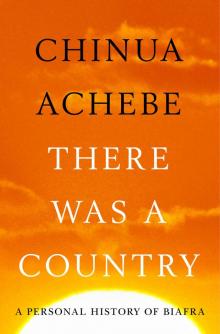 There Was a Country: A Memoir
There Was a Country: A Memoir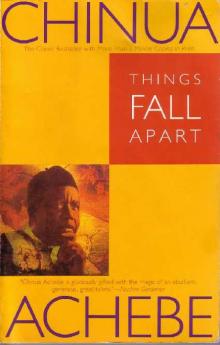 Things Fall Apart
Things Fall Apart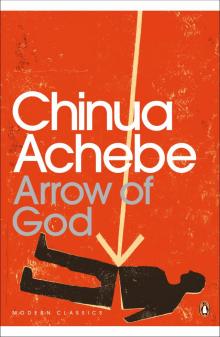 Arrow of God
Arrow of God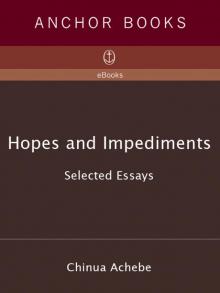 Hopes and Impediments: Selected Essays 1965-87
Hopes and Impediments: Selected Essays 1965-87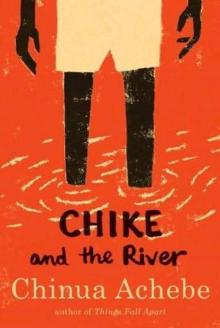 Chike and the River
Chike and the River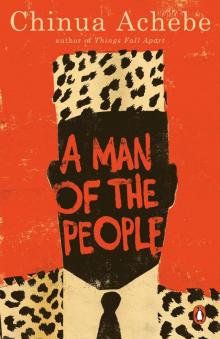 A Man of the People
A Man of the People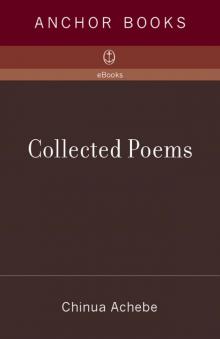 Chinua Achebe: Collected Poems
Chinua Achebe: Collected Poems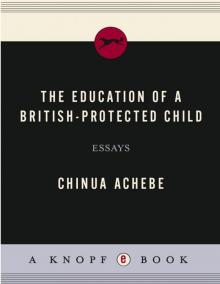 The Education of a British-Protected Child: Essays
The Education of a British-Protected Child: Essays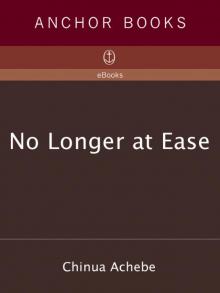 No Longer at Ease
No Longer at Ease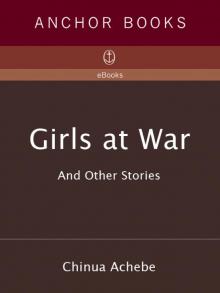 Girls at War
Girls at War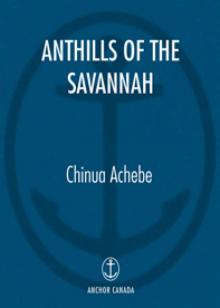 Anthills of the Savannah
Anthills of the Savannah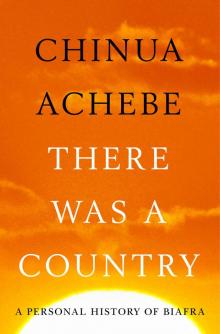 There Was a Country: A Personal History of Biafra
There Was a Country: A Personal History of Biafra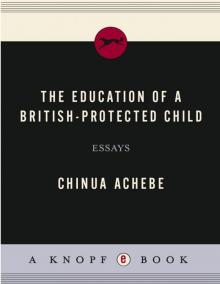 The Education of a British-Protected Child
The Education of a British-Protected Child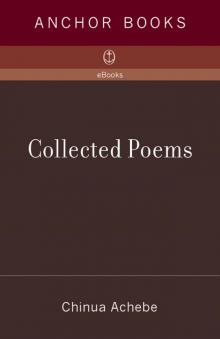 Collected Poems
Collected Poems